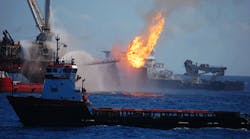Transocean Deepwater Inc. has agreed to plead guilty to violating the Clean Water Act (CWA) and to pay a total of $1.4 billion in civil and criminal fines and penalties for its conduct in relation to the Deepwater Horizon disaster. The criminal information, and a proposed partial civil consent decree to resolve the U.S. government’s civil penalty claims against Transocean Deepwater Inc. and related entities, were filed in U.S. District Court in the Eastern District of Louisiana.
“This resolution of criminal allegations and civil claims against Transocean brings us one significant step closer to justice for the human, environmental and economic devastation wrought by the Deepwater Horizon disaster,” said Attorney General Eric Holder. “This agreement holds Transocean criminally accountable for its conduct and provides nearly a billion dollars in criminal and civil penalties for the benefit of the Gulf states. I am particularly grateful to the many Justice Department personnel and federal investigative agency partners for the hard work that led to today’s resolution and their continuing pursuit of justice for the people of the Gulf.”
In addition, Transocean Deepwater Inc. signed a cooperation and guilty plea agreement with the government, admitting its criminal conduct. As part of the plea agreement, Transocean Deepwater Inc. has agreed, subject to the court’s approval, to pay $400 million in criminal fines and penalties and to continue its on-going cooperation in the government’s criminal investigation. In addition, pursuant to the terms of a proposed partial civil consent decree, Transocean Ocean Holdings LLC, Transocean Offshore Deepwater Drilling Inc., Transocean Deepwater Inc. and Triton Asset Leasing GMBH have agreed to pay an additional $1 billion to resolve federal Clean Water Act civil penalty claims for the massive, 3-month-long oil spill at the Macondo Well and the Transocean drilling rig Deepwater Horizon.
In a statement released following the agreement, Transocean commented, “These important agreements, which the company believes to be in the best interest of its shareholders and employees, remove much of the uncertainty associated with the accident. This is a positive step forward, but it is also a time to reflect on the 11 men who lost their lives aboard the Deepwater Horizon. Their families continue to be in the thoughts and prayers of all of us at Transocean.”
Under the civil settlement, the Transocean defendants also must implement court-enforceable measures to improve the operational safety and emergency response capabilities at all their drilling rigs working in waters of the United States.
The settlement and plea agreement “is an important step toward holding Transocean and those responsible for the Deepwater Horizon disaster accountable,” said Cynthia Giles, assistant administrator for the U.S. Environmental Protection Agency’s (EPA) Office of Enforcement and Compliance Assurance. “EPA will continue to work with DOJ and its federal partners to vigorously pursue the government’s claims against all responsible parties and ensure that we are taking every possible step to restore and protect the Gulf Coast ecosystem.”
According to Lanny A. Breuer, assistant attorney general for the Justice Department’s Criminal Division, Transocean’s rig crew accepted the direction of BP well site leaders to proceed in the face of clear danger signs, “at a tragic cost to many of them. Transocean’s agreement to plead guilty to a federal crime, and to pay a total of $1.4 billion in criminal and civil penalties, appropriately reflects its role in the Deepwater Horizon disaster
Uncontrolled Blowout at Deepwater Horizon
According to court documents, on April 20, 2010, while stationed at the Macondo well site in the Gulf of Mexico, the Deepwater Horizon rig experienced an uncontrolled blowout and related explosions and fire, which resulted in the deaths of 11 rig workers and the largest oil spill in U.S. history. In agreeing to plead guilty, Transocean Deepwater Inc. has admitted that members of its crew onboard the Deepwater Horizon, acting at the direction of BP’s well site deaders” or “company men,” were negligent in failing to fully investigate clear indications that the Macondo well was not secure and that oil and gas were flowing into the well.
The civil settlement secures $1 billion in civil penalties for violations of the CWA, a record amount that significantly exceeds last year’s $70 million civil penalty paid by MOEX Offshore 2007 LLC, a 10 percent partner with BP in the Macondo well venture. The unprecedented $1 billion civil penalty is subject to the Resources and Ecosystems Sustainability, Tourist Opportunities and Revived Economies of the Gulf Coast States Act of 2012 (Restore Act), which provides that 80 percent of the penalty will be to be used to fund projects in and for the Gulf states for the environmental and economic benefit of the region. This civil resolution reserves claims for natural resource damages and clean-up costs.
Under the civil settlement, the Transocean defendants also must observe various court-enforceable strictures in its drilling operations, aimed at reducing the chances of another blowout and discharge of oil and at improving emergency response capabilities. Examples of these requirements include certifications of maintenance and repair of blowout preventers before each new drilling job, consideration of process safety risks, and personnel training related to oil spills and responses to other emergencies. These measures apply to all rigs operated or owned by the Transocean defendants in all U.S. waters and will be in place for at least 5 years.
“The development and exploration of a domestic source of energy is vitally important, and it can and must be done in a responsible and sound manner,” said said Ignacia S. Moreno, assistant attorney general for the Justice Department's Environment and Natural Resources Division. “This unprecedented settlement under the Clean Water Act demonstrates that companies will be held fully accountable for their conduct and share responsibility for compliance with the laws that protect the public and the environment from harm.”
More information about Transocean’s settlement is available on EPA’s web site.
